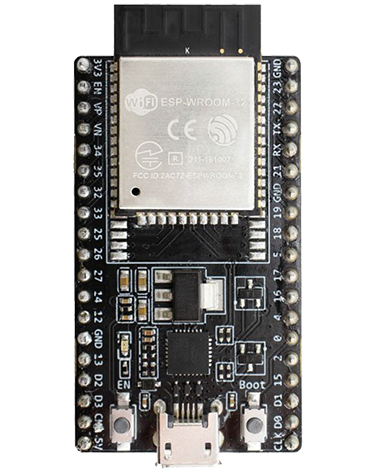ESP32-S Series
Faster, dual-core available, more GPIO, USB OTG available.
ESP32-S2 Series
Single-core 32-bit Xtensa LX7 CPU, up to 240 MHz
320 KB SRAM, 128 KB ROM, and 16 KB RTC SRAM
WiFi 2.4 GHz (IEEE 802.11b/g/n)
No Bluetooth
43 GPIOs
USB OTG, SPI, I2S, UART, I2C, LED PWM, LCD interfaces.
Camera interface, ADC, DAC, touch sensor, temperature sensor.
ESP32-S3 Series
Dual-core 32-bit Xtensa LX7 CPU, up to 240 MHz
512 KB SRAM, 384 KB ROM, and 16 KB RTC SRAM
WiFi 2.4 GHz (IEEE 802.11 b/g/n)
Bluetooth 5 (LE)
44 GPIOs
USB OTG, SPI, I2S, I2C, PWM, RMT, ADC, DAC and UART, SD/MMC host and TWAITM interfaces.
ESP32-C Series
Less GPIO, slower processor, no dual-core option, no USB OTG interface (USB pins are USB Serial/JTAG controller).
ESP32-C2 Series
Single-core 32-bit RISC-V CPU, up to 120 MHz
272 KB SRAM, 576 KB ROM
WiFi 2.4 GHz
Bluetooth 5 (LE)
14 GPIOs
ESP32-C3 Series
Single-core 32-bit RISC-V CPU, up to 160 MHz
400 KB SRAM, 384 KB ROM, and 8 KB RTC SRAM
WiFi 2.4 GHz (IEEE 802.11b/g/n)
Bluetooth 5 (LE)
22 GPIOs
ESP32-C6 Series
Single-core 32-bit RISC-V CPU, up to 160 MHz
512 KB SRAM and 320 KB ROM
IEEE 802.11ax (Wi-Fi 6) on 2.4 GHz, supporting 20 MHz bandwidth in 11ax mode, 20 or 40 MHz bandwidth in 11b/g/n mode
IEEE 802.15.4 (Thread + Zigbee)
Bluetooth 5 (LE)
22/30 programmable GPIOs
SPI, UART, I2C, I2S, RMT, TWAI and PWM interfaces
ESP32 Series
Original ESP32 series.
ESP8266 Series
The ESP32 is the successor to the ESP8266.

